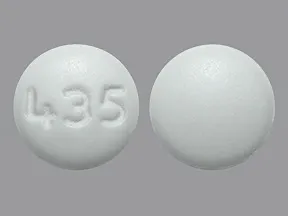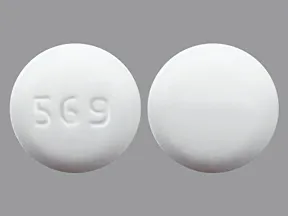Uses
This medication is used along with counseling and support to help people who are alcohol dependent not drink alcohol. Acamprosate works by restoring the natural balance of chemicals in the brain (neurotransmitters).Before starting this medication, you should no longer be drinking alcohol. Acamprosate has not been shown to work well if you are still drinking alcohol when you start taking it.
How to use Acamprosate CALCIUM
Read the Patient Information Leaflet if available from your pharmacist before you start taking acamprosate and each time you get a refill. If you have any questions, ask your doctor or pharmacist.
Take this medication by mouth with or without food as directed by your doctor, usually three times a day. Swallow the tablets whole. Do not crush or chew the tablets.
The dosage is based on your medical condition and response to treatment.
Use this medication regularly to get the most benefit from it. To help you remember, take it at the same times each day.
Do not increase your dose or use this drug more often or for longer than prescribed. Your condition will not improve any faster, and your risk of side effects will increase.
If you begin drinking alcohol again, continue to take this medication and tell your doctor promptly.
Side Effects
Diarrhea, nausea, vomiting, gas, stomach pain, loss of appetite, headache, drowsiness, dizziness, constipation, tiredness, weight gain/loss, muscle/joint pain, change in sexual desire or decreased sexual ability may occur. If any of these effects last or get worse, tell your doctor or pharmacist promptly.
Remember that this medication has been prescribed because your doctor has judged that the benefit to you is greater than the risk of side effects. Many people using this medication do not have serious side effects.
Tell your doctor right away if you have any serious side effects, including: mental/mood changes (including depression, thoughts of suicide), signs of kidney problems (such as change in the amount of urine), fainting, fast/pounding heartbeat, vision/hearing changes, increased thirst.
Get medical help right away if you have any very serious side effects, including: stomach/abdominal pain that doesn't go away, black stools, vomit that looks like coffee grounds, seizures.
A very serious allergic reaction to this drug is rare. However, get medical help right away if you notice any symptoms of a serious allergic reaction, including: rash, itching/swelling (especially of the face/tongue/throat), severe dizziness, trouble breathing.
This is not a complete list of possible side effects. If you notice other effects not listed above, contact your doctor or pharmacist.
In the US -
Call your doctor for medical advice about side effects. You may report side effects to FDA at 1-800-FDA-1088 or at www.fda.gov/medwatch.
In Canada - Call your doctor for medical advice about side effects. You may report side effects to Health Canada at 1-866-234-2345.
Precautions
Before taking acamprosate, tell your doctor or pharmacist if you are allergic to it or if you have any other allergies. This product may contain inactive ingredients, which can cause allergic reactions or other problems. Talk to your pharmacist for more details.
Before using this medication, tell your doctor or pharmacist your medical history, especially of: kidney disease.
This drug may make you dizzy or drowsy. Alcohol or marijuana (cannabis) can make you more dizzy or drowsy. Do not drive, use machinery, or do anything that needs alertness until you can do it safely. Avoid alcoholic beverages. Talk to your doctor if you are using marijuana (cannabis).
Before having surgery, tell your doctor or dentist about all the products you use (including prescription drugs, nonprescription drugs, and herbal products).
During pregnancy, this medication should be used only when clearly needed. Discuss the risks and benefits with your doctor.
It is unknown if this medication passes into breast milk. Consult your doctor before breastfeeding.
Interactions
Drug interactions may change how your medications work or increase your risk for serious side effects. This document does not contain all possible drug interactions. Keep a list of all the products you use (including prescription/nonprescription drugs and herbal products) and share it with your doctor and pharmacist. Do not start, stop, or change the dosage of any medicines without your doctor's approval.
Overdose
If someone has overdosed and has serious symptoms such as passing out or trouble breathing, call 911. Otherwise, call a poison control center right away. US residents can call 1-800-222-1222. Canada residents can call 1-844-764-7669. Symptoms of overdose may include: severe diarrhea that doesn't stop.
Do not share this medication with others.
Lab tests (such as kidney function) should be done while you are taking this medication. Keep all medical and lab appointments. Go to all of your counseling and support group meetings. Consult your doctor for more details.
If you miss a dose, take it as soon as you remember. If it is near the time of the next dose, skip the missed dose. Take your next dose at the regular time. Do not double the dose to catch up.
Store at room temperature away from light and moisture. Do not store in the bathroom. Keep all medications away from children and pets.
Do not flush medications down the toilet or pour them into a drain unless instructed to do so. Properly discard this product when it is expired or no longer needed. Consult your pharmacist or local waste disposal company.
Images

acamprosate 333 mg tablet,delayed release
Color: whiteShape: roundImprint: 435This medicine is a white, round, enteric-coated, tablet imprinted with "435".

acamprosate 333 mg tablet,delayed release
Color: whiteShape: roundImprint: 77 1140This medicine is a white, round, enteric-coated, tablet imprinted with "435".

acamprosate 333 mg tablet,delayed release
Color: whiteShape: roundImprint: 569This medicine is a white, round, enteric-coated, tablet imprinted with "435".

acamprosate 333 mg tablet,delayed release
Color: whiteShape: roundImprint: M ACThis medicine is a white, round, enteric-coated, tablet imprinted with "435".
You Might Also Like
Are you currently using Acamprosate CALCIUM?
This survey is being conducted by the WebMD marketing sciences department.
Selected from data included with permission and copyrighted by First Databank, Inc. This copyrighted material has been downloaded from a licensed data provider and is not for distribution, except as may be authorized by the applicable terms of use.
CONDITIONS OF USE: The information in this database is intended to supplement, not substitute for, the expertise and judgment of healthcare professionals. The information is not intended to cover all possible uses, directions, precautions, drug interactions or adverse effects, nor should it be construed to indicate that use of a particular drug is safe, appropriate or effective for you or anyone else. A healthcare professional should be consulted before taking any drug, changing any diet or commencing or discontinuing any course of treatment.